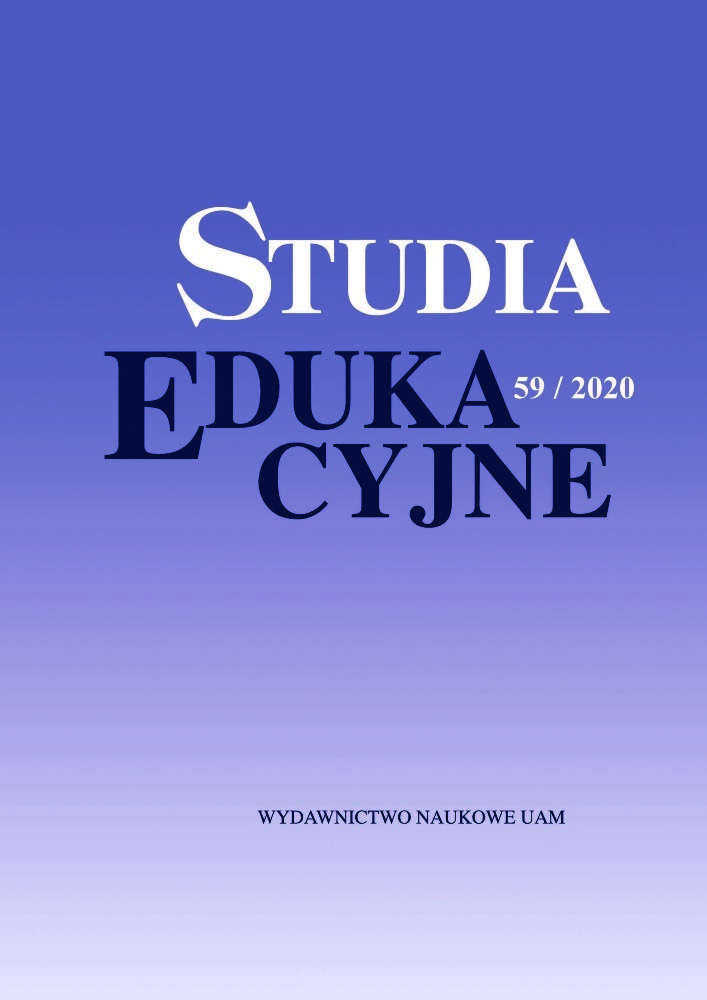Abstrakt
The Covid-19 pandemic triggered a general implementation of social distancing. According to UNESCO’s data, schools have been closed in 165 countries. Pursuant to a decision of the Polish government of 12 March 2020, classes in educational establishments were suspended throughout Poland. The Internet, viewed from the beginning of its existence as a source of numerous threats and also of unprecedented access to information, became a tool enabling the continuity of educational activity. In the present reality, teachers facing social distance, confronted by challenges at work are also evaluated by students. The present article, based on empirical studies, contains secondary school students’ opinions on the subject of the quality of distance learning. Critical opinions result explicitly from the fact that they are expressed by people having “digital attachment to modern technology” and possess heir own equipment with unlimited network access. This unprecedented state of emergency emphasizes most teachers’ unpreparedness for switching overnight to the online mode, which should not come as a surprise to anybody, because reliable preparation for distance classes involves not only the skill but also planning and proper preparation of teaching materials. Importantly, during online learning students begin to miss other people and interaction with their teachers, which emphasizes the importance of direct human relations, unduly underrated in “normal reality”. Regardless of various opinions on the subject of distance learning, it is obvious that forced switching to online learning can nd even be a catalyst of change in the educational field.
Bibliografia
Alghamdi A., Karpinski A.C., Barkley J., Online and face-to-face classroom multitasking and academic performance: Moderated mediation with self-efficacy for self-regulated learning and gender, Computers in Human Behavior, 2020, 102.
Beaunoyer E.,Dupéré S., Guitton M.J., Covid-19 and digital inequalities: Reciprocal impacts and mitigation strategies, Computers in Human Behavior. 2020, 111.
Bowman L., Levine L.E., Waite B.M., Gendron M., Can students really multitask? An experimental study of instant messaging while reading, Computers & Education, 2010, 54(4).
Dobkiewicz A., W kwarantannie wzrasta przemoc domowa. Czy polskie władze to zauważą? https://wroclaw.wyborcza.pl/wroclaw/7,35771,25859370,w-kwarantannie-wzrasta-przemoc-domowa-czy-polskie-wladze-to.html, [dostęp: 02.05.2020].
Huber S.G., Günther P.S., Schneider N., Helm C., Schwander M., Schneider J.A., Pruitt J., Covid-19 – aktuelle Herausforderungen in Schule und Bildung Erste Befunde des Schul-Barometers In Deutschland, Österreich und der Schweiz, WAXMANN, Schul-Barometer, https://www.waxmann.com/index.php?eID=download&buchnr=4216, [dostęp: 15.05.2020].
Hurwitz L.B., Schmitt K.L., Can children benefit from early internet exposure? Short- and longterm links between internet use, digital skill, and academic performance, Computers & Education, 2020, 146.
Kucuk S., Richardson J.C., A structural equation model of predictors of online learners’ engagement and satisfaction, Online Learning, 2019, 23(2).
Łupak S., Zdalne nauczanie: plotkary z ostatniej ławki wreszcie mnie nie rozpraszają, https://ksiazki.wp.pl/zdalne-nauczanie-elekcje-szkola-online-koronawirus-kwarantanna-edukacja-domowa-nauczanie-w-domu-pandemia-6504384771757697a, [dostęp: 30.04.2020].
Putz L.M., Hofbauer F., Treiblmaier H., Can gamification help to improve education? Findings from a longitudinal study, Computers in Human Behavior, 2020, 110.
Raes A., Vanneste P., Pieters M., Windey I., Van Den Noortgate W., Depaepe F., Learning and instruction in the hybrid virtual classroom: An investigation of students’ engagement and the effect of quizzes, Computers & Education, 2020, 143.
Sęk H., Wypalenie zawodowe u nauczycieli. Uwarunkowania i możliwości zapobiegania, [w:] Wypalenie zawodowe. Przyczyny, mechanizmy, zapobieganie, red. H. Sęk, Wydawnictwo Naukowe PWN, Warszawa 2000.
Sun J-N., Hsu Y-C., Effect of interactivity on learner perceptions in web-based instruction, Computers in Human Behavior, 2013, 29(1).
Surma T., Kirschner P.A., Technology enhanced distance learning should not forget how learning happens, Computers in Human Behavior, September 2020, 110.
Viner R.M., Russell S.J., Croker H., Packer J., Ward J., Stansfield C., Mytton O., Bonell Ch., Booy R., School closure and management practices during coronavirus outbreaks including Covid-19: a rapid systematic review, Lancet Child Adolesc Health, 2020, 4.
